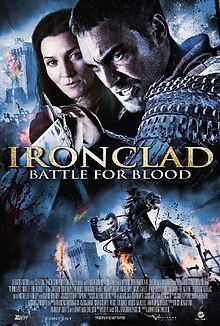Ironclad: Battle for Blood
| Ironclad: Battle for Blood | |
|---|---|
 | |
| Directed by | Jonathan English |
| Produced by |
Rick Benattar Jonathan English Andrew J. Curtis Jamie Carmichael Marija Djukelic Milos Djukelic Marko Jocic Nigel Thomas |
| Screenplay by |
Jonathan English Stephen McDool |
| Story by | Jonathan English |
| Starring |
Roxanne McKee Michelle Fairley Danny Webb Tom Austen |
| Music by | Andreas Weidinger |
| Cinematography | Zoran Popovic |
| Edited by | Laurens Van Charante |
Production company |
Mythic International Entertainment International Pictures One Gloucester Place Films |
| Distributed by |
Content Media Warner Bros. |
Release dates |
|
Running time | 108 minutes |
| Country |
United Kingdom Serbia |
| Language | English |
| Box office | $1,477[1] |
Ironclad: Battle for Blood is a 2014 adventure film directed by Jonathan English. It is the sequel to his 2011 film Ironclad.
Plot
Five years after the events of Ironclad, the de Vesci family struggles with Pict raiders along the English-Scottish border. In one of these raids, the patriarch of the family loses his arm to the chieftain's son, who is killed by the family manservant and hung on the wall. While resting in bed, the father commands his son Hubert to seek out his cousin to assist in defending the castle from the Picts. Hubert leaves in silence the next night.
Hubert discovers Guy in Kingstown at an underground brawl with his friend Berenger. Guy tells Hubert that he will help if he is paid. While they leave, they barter with the executioner, Pierrepoint, to let a prisoner, Mary, live. Even though he insists on her death because of her brutal murdering spree, he relents and eventually joins the group. Upon their return, they see that the castle is once more under siege, so they enter through the sallyport. Guy, Berenger, Mary, and Pierrepoint demonstrate their fighting capability as the successfully repel the assault.
Cast
- Michelle Fairley as Joan De Vesci
- Tom Austen as Guy the Squire
- Tom Rhys Harries as Hubert De Vesci
- Roxanne McKee as Blanche De Vesci
- Twinnie Lee Moore as Crazy Mary
- David Rintoul as Gilbert De Vesci
- Rosie Day as Kate De Vesci
- Danny Webb as Mr. Smith
- David Caves as Berenger
- Predrag Bjelac as Maddog
- Andy Beckwith as Pierrepoint
Reception
Guy Lodge of Variety wrote that English "rehashes most of his technical devices from the first film" and noted that the "production and costume design on the Serbian-shot production are economically restrained," though "Andreas Weidinger’s kitschily choral score is anything but."[2]
See also
- List of historical drama films
References
External links
| ||||||